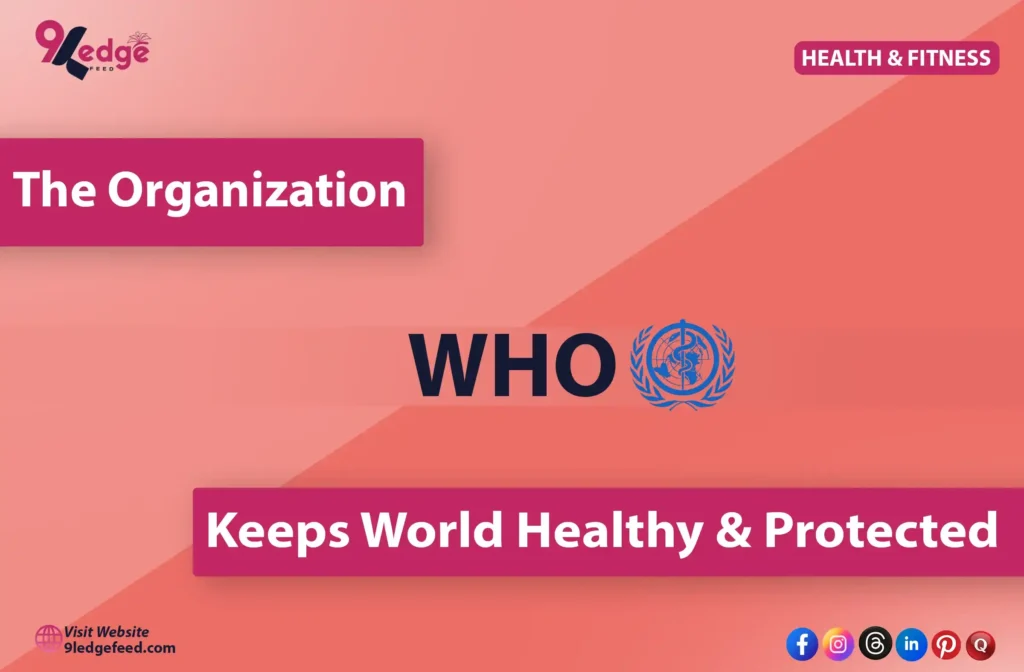If you’ve ever encountered the term ‘WHO’ “World Health Organization” you may associate it with an organization that sends out global health alerts each time a major health threat arises. But to the WHO there is much more than it can be seen at first sight. Organizations have faced pandemics before or worked for the health and safety of the entire world, but WHO is that secret helper in the background doing all the hard work?
In this blog let me take you through some information about the WHO, what it does, when and why it started, and the kind of impact it has made in the shaping of the future of health. Stay tuned to know how this powerhouse influences you and the health of billions of people all across the globe!
The World Health Organization: A Brief History
The World Health Organisation (WHO) was formed on 7 April 1948 as a specialized international organization of the United Nations system. It was established to meet the increasing demand for multilateral cooperation in the field of public health after the terrible aftermath of world war two. The founding constitution was signed by 61 countries emphasizing global support for health, especially as a human right.
The WHO’s mission from the outset was clear: for health, security in the world, and care of the weak in society. In the past years, the organization has actively participated in such important health campaigns as the smallpox eradication campaign, the polio eradication campaign, the HIV/AIDS campaign, the malaria campaign, and the tuberculosis campaign. The WHO was established in 1948 and is located in Geneva Switzerland and has six regional offices to coordinate health in the world.
The WHO’s Role in Global Health
The World Health Organisation has a central role in the international scenario for global health since it is one of the primary world bodies that advises nations on health-related issues. Here are some of the key areas where the WHO makes an effective impact:
Here are some of the key areas where the WHO makes an effective impact:
- Disease Control and Prevention: I went directly to the World Health Organization and discovered that they play a very critical role in the surveillance and management of communicable diseases. This has the role of offering advice as well as assistance to nations in preventing and containing illnesses such as Ebola, COVID–19 as well as Zika virus.
- Health Standards and Guidelines: The WHO provides health standards, recommendations of which are implemented all over the world including nutrition, vaccination, and disease management. These standards have the role of assisting the countries in performing the proper health policy that will lead to safe and healthy populations in the respective countries.
- Research and Innovation: The WHO engages and funds studies in response to diseases or conditions that affect the world’s population. This encompasses creating new therapies and vaccines for diseases that mainly plague the LICs as well as coming up with diagnostic tools and equipment.
- Health Promotion and Education: The WHO is involved in improving people’s quality of health and strengthening the global health system, either directly or by educating people about various health issues including mental health, substance abuse, and diet.
- Emergency Response: While emergencies occur, the WHO supports international health responses by providing necessary information as well as coordinating resource allocation to ensure people in need get the appropriate help.
WHO’s Impact on Global Health
The WHO as we have seen has had a great influence on the delivery of health services in the world over. They have included; the elimination of smallpox with its attendant loss of many precious lives not to mention the Health bucks. The polio campaigns carried out by the organization have almost made the disease extinct with little cases of it being reported in the recent past.
The WHO has also been very active during the COVID-19 pandemic that continues to plague the world. The WHO through its leadership on the management of infectious diseases has given directions on ways of managing the virus and closely led the process of preparing and distributing the vaccine. Its work has killed probably millions of people already and is still a mainstay of combating the pandemic.
The Future of WHO and Global Health
Looking at the contemporary world problems that affect the health of the people the need for WHO is more evident. Some of the areas that the organization will need to progress its agenda in the years to come include…Climate change and emerging diseases…Global health disparities. The WHO is already moving towards addressing these challenges with programs that are aimed at innovations in Universal Health Coverage, NCDs, and Better Health Systems Globally.
First of all, the agency of Students and Young professionals in WHA is pertinent to understand the role of the agency of WHO. Organizations should embrace people with different potentials to help create the society and the opportunity is not limited to internships, fellows, and other positions as well as careers in public health. This is to say that any time you enroll yourself to work with the WHO you will be actually getting involved in real-world activities that contribute to the development of enhanced quality of living all over the world.
Conclusion
The World Health Organisation is far more than just the letters we hear being uttered in radio or TV news etc. It is an active subjective and significant participant in the world, which is constantly striving to enhance the quality of life of each inhabitant of the planet and increase their life expectancy. The WHO stands tall as a super force in the world of public health whether it is fighting pandemics, eradicating diseases, or simply providing a benchmark to world health. For those who want to make a great contribution somewhere, the WHO defines an opportunity to contribute to something genuinely international.
So when you hear another story about the WHO you’ll understand that this organization is right in the thick of a fight for improved health around the globe. As for you who knows, maybe one day you’ll also be on the battle line!



